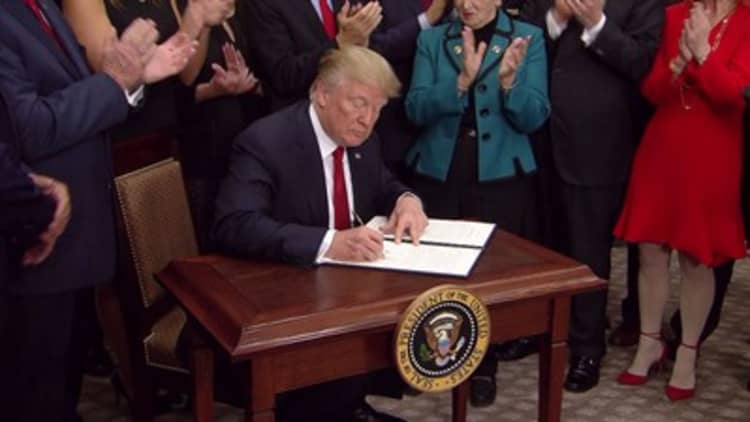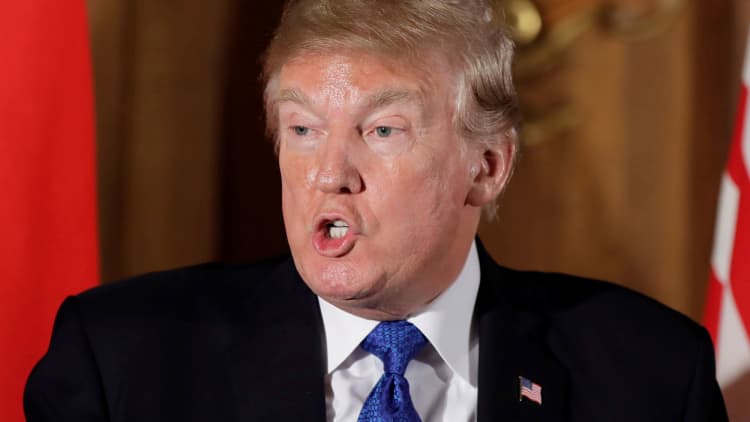
The Trump administration reportedly has prepared an executive order that would effectively gut Obamacare's requirement that most Americans have health insurance — but is holding off on it to see if the repeal of that mandate will be included in the new Republican tax reform bill.
The purported executive order would make it administration policy to not collect tax penalties from people who fail to have health coverage during the year, according to the Washington Examiner, which first reported the order.
If it were to be signed by President Donald Trump, it would be just the latest in a recent series of moves by him to undermine the Affordable Care Act, as Obamacare is formally known.
That's because the mandate effectively compels millions of people to buy inidividual health plan coverage from Obamacare exchanges. Open enrollment in those health plans started Wednesday.

If the penalty attached to the mandate disappears, many health people might drop their coverage, leaving the exchange plans heavier with sicker people who have high medical bills.
That in turn would lead to ever-increasing insurance premiums, and further customer defections, a phenomenon known as a death spiral.
House Speaker Paul Ryan told Fox News on Sunday that the repeal of the ACA's so-called individual mandate might be included in the GOP's tax bill.
"We have an active conversation with our members and a whole host of ideas on things to add to this bill," Ryan said in that interview. "And that's one of the things that's being discussed."
The Washington Examiner, citing an unnamed Republican senator, said that Trump decided not to sign his executive order on the mandate, for now, after hearing that Sen. Tom Cotton, R-Ark., was proposing to repeal the individual mandate in the tax bill.
Such a repeal would make it clear the mandate is no longer the law of the land.
Trump's order would reportedly stop short of that — because there would still be a requirement that most people have some form of health coverage — but would effectively stop enforcing the penalty associated with not complying with the law.
But if the GOP adds repeal of the individual mandate to the tax bill, it could make it more difficult to pass than it already might be.
The bill has already drawn concern from deficit hawks in Congress for increasing the federal debt, and also has been criticized for capping the limit on deductions for mortgage interest and for repealing the deductions on one's federal income taxes for state and local income taxes.
And the Republican Party's track record on full or partial repeal of Obamacare's provisions is dismal.
Although Trump has promised to sign a repeal-and-replace bill, his fellow Republicans in Congress have repeatedly failed to pass such a bill, despite having majorities in both the House and Senate.
A White House spokesman declined to comment on the Examiner's report when contacted by CNBC.
The spokesman said the administration does not "get ahead" of potential executive orders.
In 2015, almost 6.7 million taxpayers were subject to the individual mandate penalty, and paid the government more than $3 billion as a result. Millions more claimed exemption from the mandate for a wide variety of reasons.
In 2017, the tax penalty for not having health insurance coverage of some kind is the higher of 2.5 percent of household income, or $695 per adult.
Trump last month signed an executive order that directed federal agencies to explore making a series of moves that could undercut the Affordable Care Act.
Those potential actions included loosening restrictions on the offering of insurance plans by small business and on the duration of short-term insurance plans.
On the same day Trump signed that order, his administration announced that it would cease paying Obamacare insurers crucial reimbursements for discounts those insurers by law must grant to low-income customers for their out-of-pocket health charges.
The reimbursements are worth billions of dollars annually to insurers. Many health plans had raised their premium rates higher for 2018 than they otherwise would have because Trump had threatened for months to kill the payments.
Although the administration's decision will save the federal government an estimated $10 billion in payments next year, it actually will lead to an increase in overall federal payments to Obamacare insurers. That's because when premiums rise for Obamacare plans, as they did in anticipation of the cutoff and will in future years, the federal government spends more on subsidies that reduce the premium prices for low- and middle-income customers.
The Congressional Budget Office has estimated that the federal deficit will increase by almost $200 billion over the next decade as a result of Trump's decision to end the cost-sharing reduction reimbursements.
WATCH: Trump relaxes Obamacare birth control mandate



